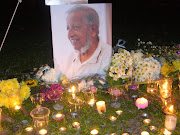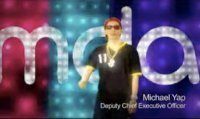Chee Soon Juan
Singapore Democrats
Feb 10, 2009
In what has become a landmark speech Minister Mentor pointed out in July 2007 that, thanks to his party, the economy was headed skywards: Tourism, consumer confidence, job creation, inflow of wealth, etc were all at an all time high. Not only was the economy going great guns, social development was apparently also doing swimmingly.
In fact things were so rosy then that Mr Lee couldn't hide his excitement: "If there are no wars or oil crises, this golden period can stretch out over many years."
Barely one, let alone many, later Singapore's economy started to go into a tailspin – and, might it be pointed out, there were no wars or oil crises.
In other words, the MM's prediction was spectacularly wrong – not that there is anything surprising with that, Mr Lee had been wildly off the mark many times before:
In January 1998 Mr Lee predicted: "I don't think you're going to get a significant or dramatic political change in Indonesia." Four months later, Suharto was toppled.
In 1995, the then Senior Minister proclaimed: "Both the Suzhou and Singapore sides recognise that they need to work as a team for the Suzhou Industrial Park to compete successfully..." Three years later, the project collapsed.
In 1997 just prior to the general elections, Mr Lee told HDB residents that upgrading would lead to a "40 to 50 percent increase in the value of your HDB property." Before the year was over, property prices plunged with the advent of the Asian financial crises.
There's nothing wrong, of course, about making bad predictions. Let's be fair, everyone at some point has made calls that have turned out embarrassingly wrong. Mr Lee has made, and will make, his fair share.
The difference with the MM's words is that they drive policy formulation which involves spending of billions of dollars of public monies. Once spoken, these words precipitate PAP groupthink; few dare to tell Mr Lee that he is wrong, let alone hold him accountable for his errors in judgement which have catastrophic consequences.
Oracle of the East he is not but you wouldn't know that if you spoke to the servants with whom the MM surrounds himself and on whom he lavishes made-in-heaven salaries. These highly intelligent individuals apparently go into a synaptic short-circuit when they are in his presence and suspend all form of independent thinking. (See also Tearing Down the Facade).
Herein lies the danger, which is that of allowing one man to call the shots and of accepting Mr Lee's propaganda that he and the people he has anointed are the only one's who have the answers to our future. This danger must be highlighted, and highlighted again and again until it drenches our national psyche.
In the beginning...
It is clear from his utterances in that fateful 2007 speech how little Mr Lee understood of the economic world. Just months before the crash of the global financial labyrinth, at a time when the system was at its bursting point, the MM told us all:
We have drawn in many professionals, especially in financial services, which has expanded to its highest ever levels. Many financial institutions have moved their top people and their regional headquarters to Singapore...Indeed, Mr Lee and his ministers had gone into overdrive to push Singapore to be the financial capital of the world, regardless of whether our national infrastructure was equipped to handle such a brutal and risky transformation or not. He did not see, nor did he understand, the decadence that had enveloped Wall Street and that the corruption was already driving the world's financial system to its knees. He was still telling Singaporeans that the boom could go on for years.
Here's what had happened: Banks in the US were hedging on the housing mortgage market through financial instruments they called "credit default swaps".
These fancily named derivatives were really nothing more than side bets -- not unlike the kind that avid football fans place when they watch two teams play each other. The bettors need not buy a direct stake in the teams but stood to gain or lose depending on the outcome of the game.
This was what happened at the banks: Essentially, bets were taken on how the mortgage-loans performed. If mortgagees defaulted on their loans, insurance would be paid out through the credit swaps that investors purchased.
Of course, the financial institutions raked in the money when the US housing market was on a roll between 1996 and 2006, with much of activity fueled, unfortunately, by unscrupulous lending. Housing loans were given to people, called subprime borrowers, who did not meet the criteria for borrowing at the prevailing interest rate. This was a recipe for trouble because as soon as the US economy and the housing market started to wobble, many of these borrowers were unable to keep up with their loan payments.
Then someone screamed “Subprime!" and all of a sudden the housing industry pancaked. Mortgage delinquencies and foreclosures escalated as Americans defaulted on their housing loans and banks were left high and dry.
But as bad as the debacle was, it still wasn't the worst thing that happened to the banks. On the side, investors came a calling and wanted to be paid because they had bought the credit default swaps. The problem was that the banks and investment houses had sold so much of these instruments that they were simply overwhelmed by the amounts they owed (estimates have it in the trillions of dollars). Unbelievable as it may seem, these financial institutions did not set aside any funds to make these payouts. The scheme was really nothing more than legalised gambling run by over-leveraged bookies. Hence the banking meltdown.
Of course, hind-sight suffers not from astigmatism. But there were many signs that all was not right within the financial world. Billionaire investor Mr Warren Buffet had repeatedly warned of the scourge of the derivatives market, calling them “weapons of mass financial destruction”.
As early as 2002, Mr Buffet was already warning: “I view derivatives as time bombs, both for the parties that deal in them and the economic system.”
In 2003, he repeated his message that derivatives can push companies onto a "spiral that can lead to a corporate meltdown" and didn't mince words saying that these financial schemes have been devised by "madmen".
Mr Buffet rang the warning bell again in May 2007: "There is an electronic herd of people around the world managing an amazing amount of money...I think it's a fool's game."
As prescient as he was, Mr Buffet was not the first to sound the alarm against the Wall Street whiz kids. Dr Frank Partnoy, an investment banker himself before he became a professor at the University of San Diego, had written a book back in 1997 entitled F.I.A.S.C.O. in which he warned about the shenanigans that were going on in the financial houses.
He authored another book in 2003, Infectious Greed, where he again called attention to the marketing of derivatives and how this was destabilising the financial market.
Another academic, New York University's Dr Nouriel Roubini, had warned at the World Economic Forum in 2007 that a “hard landing” was about to come with the bubbles created by the financial system. (Were any of our ministers there?) He predicted that all the unbridled wheeling and dealing would end in “painful consequences for the U.S. and the global economy.”
Note that these red flags were all raised before Mr Lee Kuan Yew made his “golden period” speech (Mr Buffet's "fools' game" warning came just two months before).
In fact, just before the MM's speech, Bear Stearns, then the fifth largest investment bank in the US, was breathing its last breaths. Two of its hedge funds were up to their eyeballs in the mortgage derivatives market and they were bleeding funds. The bank was losing so much money that shortly thereafter it filed for bankruptcy.
If the Buffets and Partnoys were screaming about the risks, and if Bear Stearns had collapsed in such a stunning fashion, why did Mr Lee and his cabinet ministers not note these danger signals and adopt a more cautionary tone in his speech? Were they all asleep at the wheel?
But not only was there no circumspection, Mr Lee was urging everyone to “maximise our opportunities in this golden period”!
In competence and in experience
Mr Lee had claimed sole credit for himself and his ministers that things had gone on so well. He actually started off his speech with this:
Every night there is this buzz along Orchard Road. It is because a competent and experienced team of ministers took painful and unpopular measures in the last few years since the Asian financial crisis to get our domestic policies to encourage growth. Tourism is up. Consumers have confidence; restaurants, food courts are thriving; unemployment has remained low at 2.9 per cent with a healthy creation of 49,000 jobs for the first quarter this year. This is on top of a record creation of 176,000 jobs in 2006. We are into a period of good economic growth and social development. (emphasis added)He repeated the line later in the same speech: "An experienced team of ministers is getting our policies set in the right direction." In 2003, never tiring of reminding the people of his goodness, Mr Lee repeated that Singaporeans were fortunate in having a "competent government in charge, anticipating events."
“Competence”, “experience”, and the ability to “anticipate events” are the words Mr Lee chose to describe himself and his ministers, and to justify their salaries. Indeed if they all possessed such traits of distinction why did they not see, and warn Singapore of, the crisis that was brewing and all the warning signs that were hollering for attention?
Now that the MM's rhetoric has been so extravagantly shown up, there is only silence within the establishment. Speech? What speech? seems to be the new strategy going forward. Everyone pretends that it was never made. And yet, that speech is probably the most serious misjudgment of Mr Lee's carreer.
But among the many words that Mr Lee has spoken only one matters, but it is one that we will not hear: Accountability.
Click here to read Part 2 of Holding Lee Kuan Yew accountable














1 comment:
Sir
We are doing something here.
Please support us.
Post a Comment